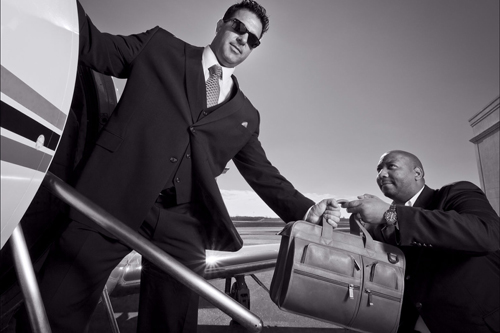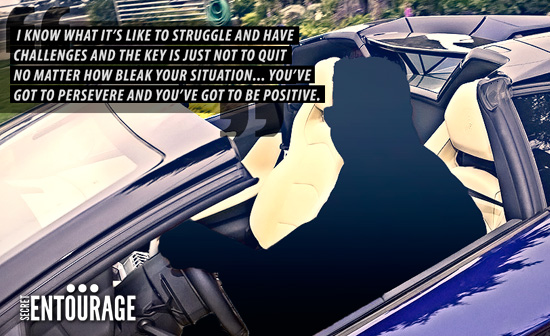
Basically, Illuminati Trust is a diversified company where I have the majority of my holdings in, which range from private aviation, to insurance, to private yachts, to mergers and acquisitions, to technology, and then finally the Internet.
I grew up in Boston, Massachusetts and came from an Italian family when my grandparents came over on the boat from Italy. We grew up very poor and I joke around with my friends and tell them that my first job was at 8 years old where I stole food from the back of restaurants to basically support my family and to allow us to have dinner, eat, and basically survive. It was a pretty challenging upbringing but it made me stronger and I think it built me into the man that I am today.
I actually went to school on a sports scholarship because I did very well in high school and that propelled me to study really hard and get into good colleges, and I ended up going to University of Miami. I was just blown away that they had an on campus pool, that there were girls everywhere in bikinis. I was coming from a strict Catholic all boys’ school and this was like a vacation. I really hit the jackpot when I saw that and I said, “Listen, you know, we don’t need to see any other colleges. This is where I’m going,” and it ended up working out really well. I got my degree in finance and I really just started from there.

I actually worked while I was in college. I was still poor in college, didn’t have any money. My first job I guess was as a bouncer. I used to receive $50 a night for bouncing and then an extra $50 if I kicked anybody out that was about to get in a fight or cause some problems. I was doing this four days a week so this was kind of a full time thing. I’m working at 8 o’clock at night until 6 in the morning and then it got to the point where I had this big fight. It’s kind of ironic where I joked around with Dwayne Johnson back then who is now The Rock and I told him that I was actually the first one that he laid a smack down at Coconut Grove at Club Callaway’s. He and a bunch of the guys in the football team decided to get in a fight with me and that was basically the end of my bouncing career.
It was interesting because the next day we were in campus, I was pretty banged up and all the football players came to me and I thought we were going to get into another fight. I was like, “Man this is crazy.” I already got beat up once. They were like, “Listen, we want to talk to you. We’re sorry about what happened. We want to put water under the bridge” because I think they were really afraid that I was going to go to coach Erickson at that time who was the coach of the team, and was going to cause an uproar, but I assured them that I wasn’t going to do that. It wasn’t a big deal and we actually became close friends after that. We went to the gym together and worked out, and still kept in touch.

I got approached by three other kids from school and they all came from wealthy families. They were like, “Listen, we have this idea. Our families have a lot of contacts in Venezuela, Argentina, Brazil” and they said, “We want you to kind of be the front man of the company because we’re more passive, not as aggressive as you, and we know you know a lot of people” and so on. I thought they were crazy at first and then when I realized that my bouncing career was pretty much over, I said, you know, I don’t really have any other options at this point so I said, “Okay, I’ll do it.”
We got into the import/export business with exporting cell phone accessories to South America. At that time, the cell phone boom had just started. Everybody wanted a cell phone and they had a lot of challenges with the batteries. They were using NiCad batteries at that time and they only lasted between three and six months. To replace the batteries, it was almost $200 to get a new battery for your phone so we felt there had to be a better solution.
One day, we were playing around with our phone batteries. I decided to get a hammer and cracked open our battery. I realized that there were six AAA batteries inside the plastic case and I was amazed because I thought the batteries would be some crazy high tech special liquid or something crazy along those lines, so when we realized they were simply AAA rechargeable batteries, we then commissioned a company in China to see if they could replicate it and they did. They replicated it for very little money and we in turn came up with a company. It was called Level and we branded it in South America and sold the batteries at about 50% of what the major manufacturers were charging.
It was really the first time I ever had money and basically, I just went absolutely bananas. We were making a lot of money, close to $80,000 a month for me personally which was astronomical whereas prior to that, I think the most I made was like $170 a week maybe.


It was really good until something happened by the way of a coup attempt which is when the rebels storm the government of these countries and basically take over. They told me: “Yeah, there as a coup attempt in Venezuela and the Venezuelan banks aren’t letting any money out of the country.” We were like, well, we’ve got bills. We have credit card bills. We have money we owe. We have car payments and we had no money coming in. It was a huge challenge so we decided to fly down there and long story short, we actually met with our banker and he pretty much extorted us that we have to give him $400,000 in a suitcase so we could bring it back to the US and salvage what we had left. That’s a crazy story.
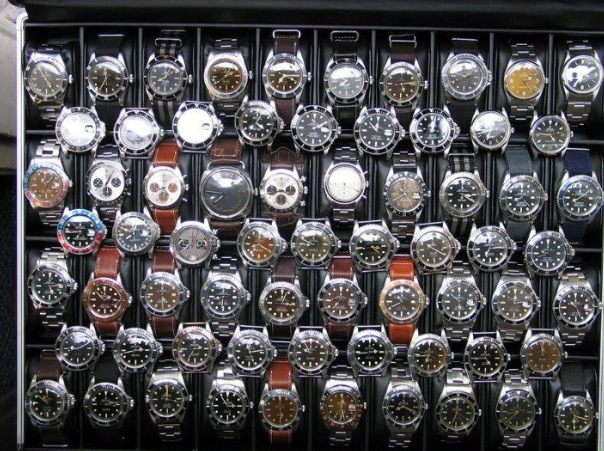
We each ended up with maybe $400,000 left of that whole business and I was living down on Brickell in Miami. I was still having a good time. I was going out every night. I love going out and having fun. I was a young kid and my parents came down to visit me and they saw basically the state that I was in as far as drinking, partying and what have you, and they were just astonished.
They basically put their foot down and said no more Miami for me and I ended up moving to Palm Beach. They basically brainwashed me into opening a restaurant. My family had been in the restaurant business in the past and I opened a restaurant in Palm Beach. My life kind of went from the exciting to the boring where most of our customers were senior citizens. I don’t think there was anyone on the island of Palm Beach under 60 years old and here’s me, a 21-year-old kid, a 22-year-old kid running a restaurant. It was a pretty big dramatic change.

For the first couple of years, I really liked it. We had a lot of celebrities come in. We had John F Kennedy Jr come in all the time with Al Pacino. We had a lot of people that would visit Palm Beach in the winter for the season and I got to really enjoy that, got to be friends with some of the people. After a couple of years, it just started to drag in me. I needed a bigger challenge. I needed something new so I sold the restaurants and I made some money. I got a call from my friend, he said, “Listen, there’s this thing called the Internet. It’s going to be big someday and we’re starting this company in the old IBM facility in Boca Raton. Why don’t you come down and take a look?”
I drove down, I took a look, and it was just amazing. People were hopping, running around. Money was being made hand over fist. The stock market was going through the roof. They were like, “Listen, we can’t give you a job but if you want, we’ll make you an intern.” So I was kind of a laughing piece. I was pretty successful prior to this and I saw a lot of the people that were making money and I decided to take the job as the intern and it was ironic because I had the best car at the time out of all the employees and I was the intern. At that time, I think I had the new Mercedes S-Class and then I had a convertible Corvette too, so I had two cars. I was driving to work with different cars and people were like, what is this intern doing with all these cars?

That company was an incubator for technology companies and I learned a lot about the Internet there because we incubated about 20 companies and they made pretty much every mistake imaginable and being in the front lines of that, seeing all the mistakes they made, I knew what mistakes not to make when I get my chance to do my own company because I saw all their failures. That really helped give me a good foundation on the Internet. It got me into domain names, it got me into understanding how to buy and sell intellectual property so it was a big game changer for me. Then the Internet bubble crashed and I decided to take a break from that.
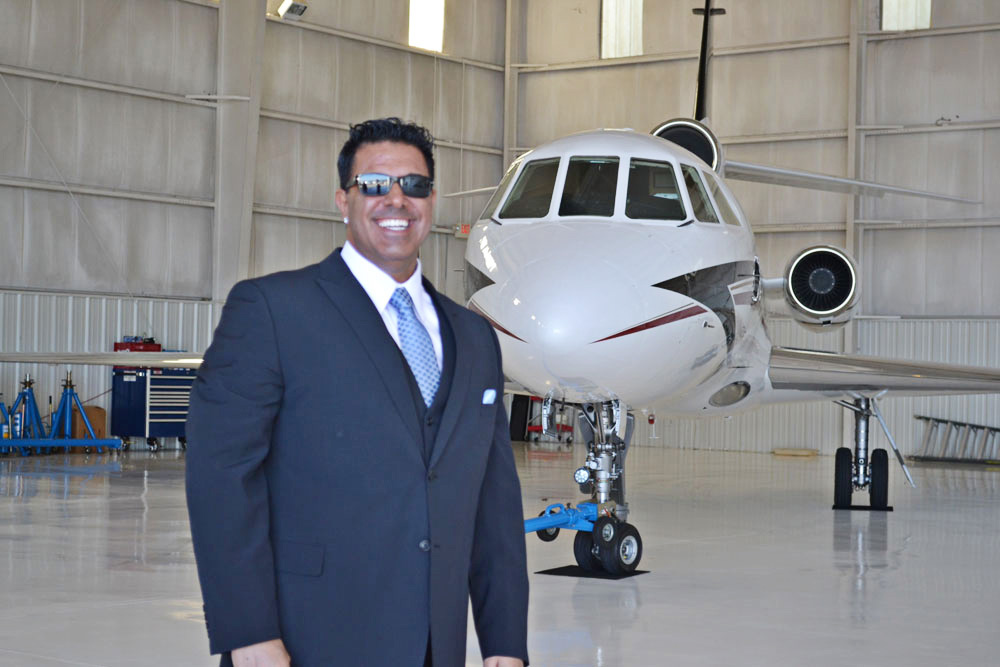
I decided to leave and got into real estate. Basically what I started doing was rehabbing houses. I would buy 4-5 houses a year. I would rehab them. I would make a good amount of money and I really was good. It wasn’t really a difficult job. I didn’t have to work every day so I had a lot of free time.
Then really, another game changer was I went to Las Vegas for a real estate convention. I met a gentleman and he asked me what I did for my financing when I sold my houses. I said truthfully as long as the buyers come with cash, I really don’t care. I really don’t do anything with the financing. I just rehab the houses and sell them.” He said, “Well, that’s a mistake. You should be financing the houses as well.” I said, “What do you mean?” He said, “You should be offering 100% financing to help get your buyers into the house and then you can make an extra $6,000 – $8,000 on every transaction.”
I thought that was interesting so I ended up getting my mortgage broker’s license and ended up financing the clients who wanted to buy my houses. Once I realized that you could do more loans and more mortgages than you could sell houses, I decided to get into the mortgage business full time. I ended up taking a job where I was with a developer where I was selling homes in Wellington. They had a $1,000,000+ homes. I started doing really well. Everything was going great and then I got a call and the call was from a guy who was working at the time at the World Bank of Canada. He said, “Lou, you’ve got to come by. The office is booked. You’ve got to check out this operation.”
I was like, “Listen, you know I’m making good money. I’m happy. I’ve got a good job. Why would I want to come by and change things?” He’s like, “You’ve got to see what they are doing. It’s really innovative. It’s something that no one has ever seen before. You’ve got to check it out.”
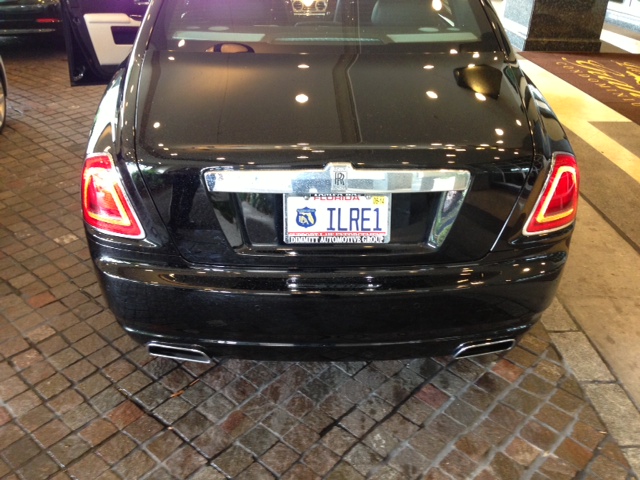
I decided to take his advice and I came by the office at Boca Raton and met a gentleman by the name of Allen Rickstein and he basically introduced me to what was called Internet leads at that time.
What he explained to me is, “Instead of lending money just in Florida, we lend money throughout the entire United States and what you do is you come to work every day and on your desk, you’ll have 10 Internet leads where you will call those people and you’ll try to basically sell them a mortgage.” I looked at this guy and I said, “You got to be absolutely crazy.” This has to be like a boiler room. This has to be some con artist scheme or something because there is no one in California that’s going to give me their tax returns, their Social Security number, their credit reports and I’m here in Florida and we’ve never meet. They don’t know if I’m working out of the trunk of my car, or an office.” So, I was very, very skeptical.
Finally, there was another gentleman that worked there. He was from Boston and we went to lunch. He said, “Listen, last year I was living in California and I was flipping pizzas. I was making $8 an hour and barely getting by. I came here last year. I started working at World Bank of Canada doing these Internet leads and last year, I made $200,000.” I was like: Wow, if this guy can make $200,000, I could probably make $2 million.
I decided to roll the dice and take a chance, and that was really one of the big turning points of my life where I got to learn about Lending Tree and how when you aggregate leads off the Internet for people that want products or services, you are able to generate a lot of money. We made a lot of money in mortgages and what they did was they gave me the recipe for success in all of the other verticals that we’re in now.

Instead of buying the leads which they were doing originally, I decided to build out 300 websites that were all conducive to loans, mortgages, and home equity lines, so I was getting my own individual leads, booking some of the deals myself and then leveraging it by giving it to the other guys in the office. Then we started doing really well and then I said to myself, I said, “Okay, we basically have the recipe here. How do we replicate this? What other industries would this be applicable for?”
So we started targeting other industries that this would be applicable for, started rolling them out, and then before you know it, we had 37 different verticals selling everything from women’s clothes, garbage bags, to you name it. So really, that’s how we got involved in the Internet.
That then spurred us on to get into the stressed asset business where we would buy distressed technology assets, whether they are patents, trademarks, licenses, things like that, a lot of bankrupt companies. The attorneys and the trustees would call me and ask if I’m interested in these assets. A lot of times I will repackage them, renegotiate the licensing deals and then sell off the assets and make a profit.
That’s how it all really started. We started with the Internet, that got me into the insurance business, that got me into the private jet business, that got me into all the other businesses that I’m in now.

It was fantastic because I saw these guys getting these beautiful offices and beautiful equipment, computers, and hiring all these people. They were doing all these things before they made their first dollar. They didn’t even improve their concept but they all thought they were going to be successful, rich, and probably made a million mistakes each.
I kept taking notes of every mistake that they made and I realized that until you can make a $100 a day with whatever business vertical you go in, it’s not actually a business. Once we get to a point where we make $100 a day, then we know we can leverage that and scale it and now we have our real business, and when I was with these companies, they weren’t worried about making $100 a day, they are always worried about making $10 million or $20 million.
I learned that you can’t go from $0 to $10 million overnight. It’s a gradual process. You start with $0 and go up $100, then $1,000 then $10,000 then $100,000 and so on. So that was one of the big lessons that I learned especially when investing.
We do a lot of investing in companies, startup companies, things like that, and I look at all these business plans and proposals, and I look at the projections and they will have zero revenue and then within a year, they are going to have $20 million. I laugh at that and I said, it just doesn’t work that way. There’s no hockey stick revenue model. You have to start off and build and it’s a gradual process. It’s not something that happens overnight. It helped give me a foundation as to how to build a company and grow it.



Well it was interesting because first when I did it, I think I might have paid $10,000, believe it or not, for my first website and I realized that I was going to need a lot of money to make this work to build out 300. So I did some research and I realized that right now, we’re living in a global marketplace. It’s not just Florida or United States. It’s really the whole world and I came across a gentleman who had a company in India and we basically made a deal where if I committed to a certain amount of websites, he would charge me a ridiculous price to make them because the labor at that time in India was maybe half of what it is now.
India was just starting to go online. There were no large companies there so I was making the websites for a couple $100 each, which was incredible. I had guys that were PhDs building these websites and they were all unique with all unique content so I really hit the jackpot by getting into India really early in the game. A lot of those guys still work for me today. We have a team of 12 guys in India that are continually developing websites, coding, and structuring things, so on and so forth.


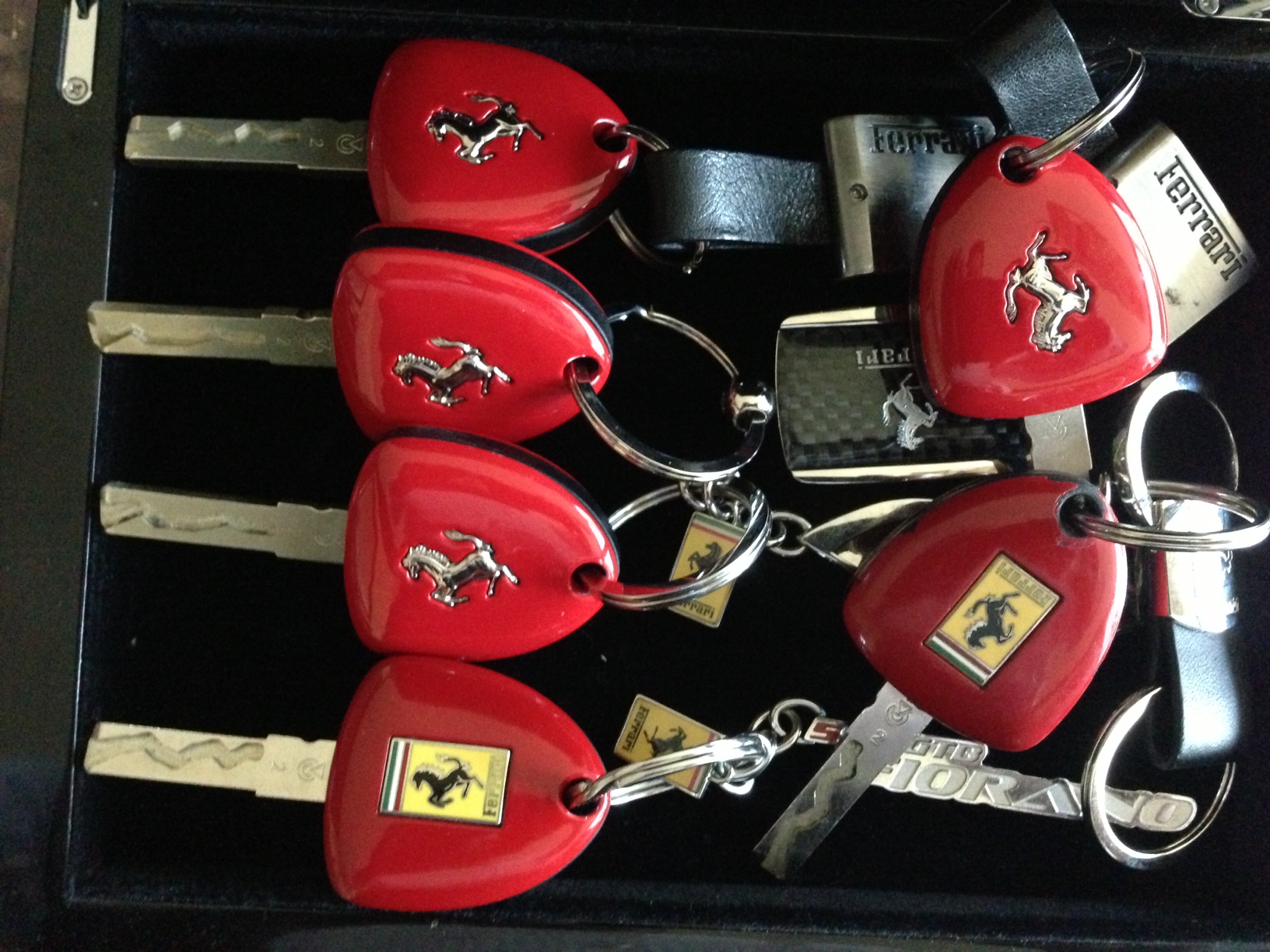
What we did was we did a couple of things. We bought the best domains within each niche of mortgage and then we just focused on that one niche for each website instead of trying to be much broader and go for everything within the mortgage business. We were just trying to do one niche whether it’s interestonlyloans.com, FHAloans.com, things like that. Where most of our competitors were taking a shotgun approach, we were basically taking a sniper rifle approach and I think that gave us a big competitive advantage and help us aggregate a lot of leads.

Well we had a competitive advantage where I was working at that time for the World Bank of Canada and we had 80 loan officers in my office so basically what I would do was take the leads I needed and then I would just go down the hall to the other guys, give them the leads, and if they booked the deals, I would get a override. So instead of having to sell them, I would just hand them to my fellow colleagues.
We kept everything internal because there was more profit to be made versus selling them for, say, $25, $30 a lead. If we booked a deal, we’d make anywhere from $3,000 – $10,000. It was a big difference so I felt it would be more efficient to monetize them internally which in turn will help the company, help the loan officers, and it was just a win-win for everybody.
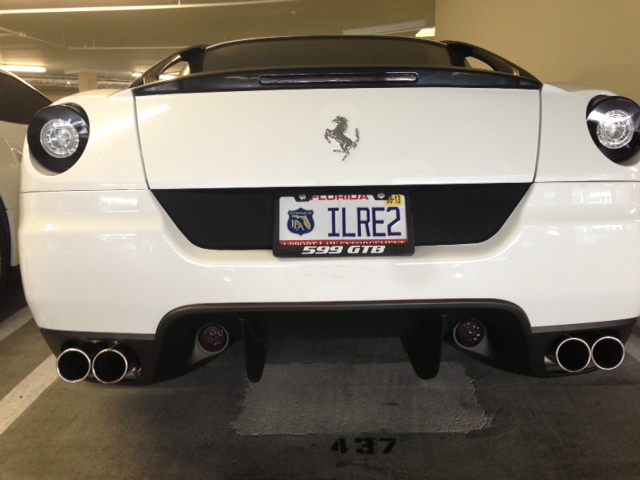
I got in on accident with a friend of mine who wanted to get into a real specific niche within insurance and at that time when he approached me, I thought he was crazy. He came from a very wealthy family. Both his parents were willing to back the project financially and he said, “Listen, I’ll give you 50%. I know you know the Internet. You know how to monetize it. I just don’t know how to do it. I need someone with the expertise and one thing led to another and we started monetizing this really finite niche, which was insurance. We started growing it and then back in 2010, we got approached by a private equity company who eventually ended up buying us out for a large nine figure number.
That was our first large liquidity event. We had some seven-figure liquidity events but nothing on the scope of nine figures, so that really opened my eyes to things and opened my eyes to the real money to be made when you’re selling with liquidity events rather than building the business, taking a salary, things like that. The goal should always be what do I have to do to put this business in a position to be sold or acquired.

We have 30 professional franchises. We’ve also partnered with two other insurance companies so now we have a total of three insurance companies under the Illuminati Trust umbrella. I’m obviously a big proponent of insurance. I love insurance. I love the recurring revenue. We’ve had a tremendous amount of success with it so it’s something that I definitely want to continue to pursue and hope to have more liquidity events with.
Normally what we do is we insure the facility and the team itself. We’ll do the health benefits for the team employees, not the players. The players in the organization are actually separate so we don’t do as much with the players. We do more with their schemes, their real estate, the stadiums, their parking lot, their liability, their director’s insurance, executive’s insurance, things like that, where the team needs to be insured. They have a facility. They have a training facility. They have offices, things like that and then their employees and staff usually number about 200 on average and we do their health and benefits as well.
The only thing we really do for the players is what’s called the DI insurance, which is disability insurance and basically, they take out insurance policies in the event that they had a catastrophic injury, if they blew out a knee or blew out a shoulder, we would then pay them a prorated share of their salary, and a lot of the players do have that.

For a superstar basketball player or even a superstar football player or baseball player with $100 million contract, typically their premiums will probably come close to $1 million. It would be significant if they wanted to insure that entire contract.
There are a lot of variables. Football is more expensive than, say, baseball. There’s less risk of injury and basketball has less risk of injury. Hockey it’s not as prevalent for whatever reason. Soccer it’s not as prevalent for whatever reason. So really, the most expensive ones are football because the collisions, the contact, and things like that.

Once I got a little success, I decided to start flying private and I wanted to test it out. One of the things that I thought was really strange was there was absolutely no transparency in the industry. I would just get a price and I wouldn’t know how much anything cost. I wouldn’t know what the fuel cost, I wouldn’t know what the pilots cost, the airport cost, the taxes, what have you.
We that there could be a better solution where I didn’t want to pay $500,000 for jet card upfront or $1 million for a jet card upfront so we came up with a situation where we said, “Okay, what if we basically let all our passengers or consumers fly for dead cost, have complete transparency where they know how much they are paying for fuel, how much they are paying for insurance, how much they are paying the pilots, how much they are paying everything A-Z.
What they do is instead of getting a jet card, they would just pay a membership fee. So for example, we have a membership fee as little as $5,000 that lets you fly four times a year anywhere around the world and you pay dead cost. So the example we give people is if you’re flying from New York to London, typically that could be a $200,000 flight for argument’s sake and if you’re saving 20%, which a lot of times is the mark up, you could be saving $40,000 by flying with us because you’re paying the direct operational cost rather than what the mark up is. So that’s how the whole thing kind of started.
We decided to develop an iPhone app, an Android app, everything is done through the iPhone and Android right now. We streamline the process where it’s easier to book a private jet than it is to book a commercial airline ticket. Everything is transparent. Everything is done online, the contracts, the communication, you name it. Your wife can be shopping at the mall and you could be sitting down while she is trying on dresses, and book your private jet to LA and get ready for your weekend.
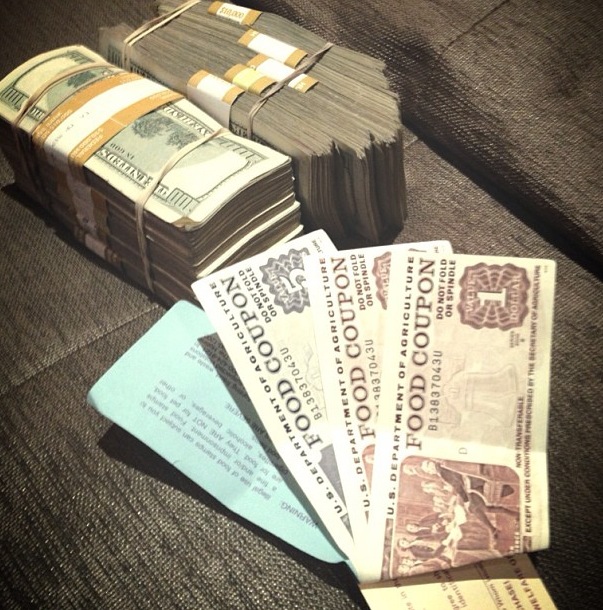
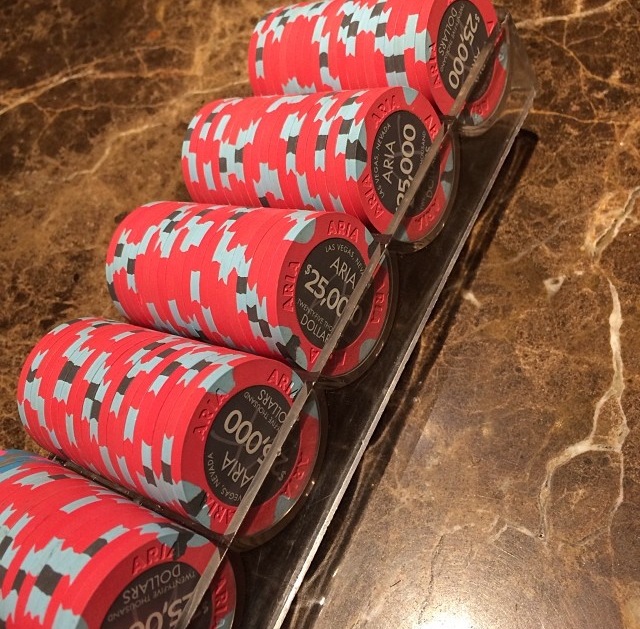

I think in the beginning I got very lucky. We’re partnering with my three friends from college and I think I gained a reputation where anytime I did a partnership, I made money for the people I was partnering with. Internally, getting that reputation like that, it just continued to grow and grow and really, I’ve never sought anyone out of true partnership. It’s typically people seek me out and they come to me and they say, “Listen, I have this idea or I have this company, what could we do to take it to the next level and that’s usually how we form the partnership. So, I think it’s two things, 1) by-product of the initial success and then 2) being very particular who I partner with and having them come to me where I know that they have a demand that I think I could fill.
I like it better when someone comes to be because I know they are motivated, I know they are hungry. I know they are focused on their business, I know they want to take it to the next level and they either need my financial backing, my contacts, or my experience, and things like that, and I think that gives us a competitive advantage versus me going to someone and trying to convince them, “Hey, let’s take your business to the next level” when in reality, they may be very happy where they are in life at that time.
When someone comes to me and I can look in their eye and I could see how hungry they are, how much they want success, how much they believe in it, how passionate they are, and their wife tells me that they don’t come home until 12 at night and she hardly ever sees him and he’s not home in the weekends. Those are the characteristics that I look for and you can’t really find those if you’re the ones seeking out the partner. I think the partner has to seek you out and if they have that drive, determination, and perseverance, I think with my help, my experience, and my background, it gives us a good formula for success.
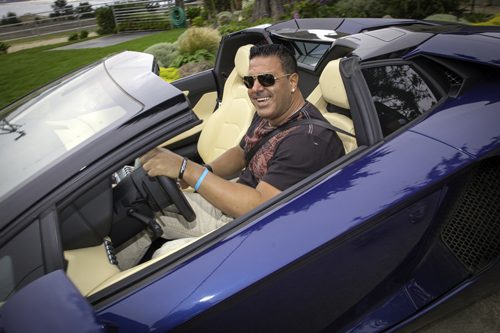
Well, one of the big disappointments, believe it or not, that I experienced is once you do have a certain amount of wealth and you basically buy everything you’ve ever dreamed about, life gets pretty boring. When you have all the cars and you have all the watches, and you have pretty much everything you could ever dream about, then what’s left?
I realized that the excitement, the juice I call it, is really in the business aspect of it. It’s starting something, creating something, taking it to another level and that’s where I get my satisfaction from. It’s not really a materialistic thing. It’s more of a challenging thing where if I could keep doing things, keep having liquidity events, keep growing, then eventually when I do retire someday when I get older, hopefully it won’t be for a while, I’ll have more to give back. I’ll have more to give back in a way of philanthropy. I’ll have more to give back in the way of helping people and I think I’ll just be a more productive citizen of the world.

The one question I get the most is what’s the secret and I tell people “If I knew the secret, I wouldn’t tell you because I’d be selling it.” The answer to that question is there is no secret. I wish there was because I would be using it all the time.
The secrets are really simple, 1) work harder than everybody else. Get up earlier, stay later, give it everything you have. 2) Make sure you have goals that are really defined because if you want something in life, there’s no limit. There’s no limit to what you could have or what you could achieve, but you’ve got to write down your goals, you’ve got to look at them every day and every action, every decision you make has to be geared towards those goals. 3) Don’t quit. No matter how bad your situation is, no matter how many adversities you have, don’t quit.
I’ve been through going to sleep at night with no food, no water, having to steal food out at the back of restaurants just so we could eat. So, I know what it’s like to struggle and have challenges and the key is to just not quit no matter how bleak your situation may look. You’ve got to persevere and you’ve got to be positive.
